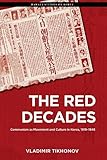The Red Decades : Communism as Movement and Culture in Korea, 1919–1945 / Vladimir Tikhonov.
Material type: TextSeries: Hawai'i Studies on KoreaPublisher: Honolulu : University of Hawaii Press, [2023]Copyright date: ©2023Description: 1 online resource (280 p.) : 15 b&w illustrationsContent type:
TextSeries: Hawai'i Studies on KoreaPublisher: Honolulu : University of Hawaii Press, [2023]Copyright date: ©2023Description: 1 online resource (280 p.) : 15 b&w illustrationsContent type: - 9780824896089
- 335.4309519 23/eng/20230613
- HX758.A3 T55 2023
- online - DeGruyter
| Item type | Current library | Call number | URL | Status | Notes | Barcode | |
|---|---|---|---|---|---|---|---|
 eBook
eBook
|
Biblioteca "Angelicum" Pont. Univ. S.Tommaso d'Aquino Nuvola online | online - DeGruyter (Browse shelf(Opens below)) | Online access | Not for loan (Accesso limitato) | Accesso per gli utenti autorizzati / Access for authorized users | (dgr)9780824896089 |
Frontmatter -- Contents -- Acknowledgments -- Introduction: The Red Age Worldwide and Colonial Korea, 1919 to Late 1930s -- Part I: The Organization -- 1. Actors of the Korean Communist Movement -- 2. Factions and the Meanings of the Factional Strug gle -- 3. The Communist Programs -- Part II: The Realm of New Knowledge -- 4. The Marxist Philosophy of Pak Ch’iu -- 5. The Socialist Concepts of Nation and History -- 6. Kim Saryang’s Observation of Liberated China, 1945 -- 7. The Red Capital of Moscow in the Eyes of Korean Travelers -- Postscript: The Afterlife of Socialism in the Two Koreas -- Notes -- Bibliography -- Index
restricted access online access with authorization star
http://purl.org/coar/access_right/c_16ec
Focusing on previously neglected cultural expressions of colonial-period Korean socialism such as Marxist philosophy, Marxist historiography, and travelogues by socialist writers, The Red Decades reveals Marxian socialism as a cultural phenomenon of colonial-age Korea. Providing an account of the social composition of the Communist milieu in 1920s and 1930s Korea and outlining the aims of the colonial-period Communist movement as formulated in programmic documents, this text offers a rich, nuanced description of the microcosm of Korean Communism—a setting of factional alignments, pilgrimages to Moscow, extended stays of the Korean revolutionaries as exiles in China and the Soviet Union, and a polylingual environment with Chinese, Japanese, English, and Russian being equally important as the idioms of socialist propagation and international networking. Placing the endeavors of colonial-age Communists within a global historical context allows for dissections of how Korean socialists' ideals interacted with the realities of the conservative turn taking place in the Soviet Union since the late 1920s, as well as considering the implication of Stalinism for Korean revolutionary culture. Yet this analysis also focuses on the individuals involved, especially on their persistent issue of factionalism in the Korean Communist movement and on the role of underground radicalism in shaping the subaltern subjectivities of the participants.The Red Decades discusses the world-historical place of “alternative modernity” that colonial-age socialists of Korea were pursuing. Based on a wealth of Japanese, Korean, Russian, and Chinese primary sources, including the Korea-related parts of the archives of Comintern, an under-utilized resource in Anglophone scholarship. The research also accommodates the achievements of the last decades, from South Korean, Japanese, Chinese, Anglophone and Russophone academic worlds. The breadth of this study situates the philosophical, historiographical, and political practices of Marxism of colonial Korea in the global historical perspective and simultaneously explores the long-lasting influences of the Communist movement in post-1945 North and South Korea.
Mode of access: Internet via World Wide Web.
In English.
Description based on online resource; title from PDF title page (publisher's Web site, viewed 06. Mrz 2024)


